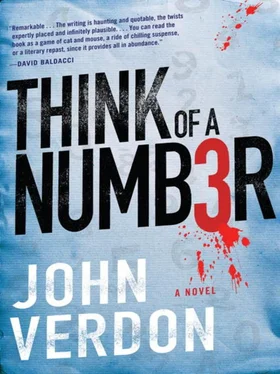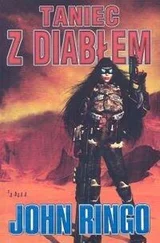He chose a space between two gargantuan SUVs. While he was parking, he became aware of a woman watching the process from behind a low bed of dahlias. When he got out of the car, he smiled politely at her-a dainty violet of a woman, small-boned and delicate of feature, with an old-fashioned look about her. If she were an actress, thought Gurney, she’d be a natural to play Emily Dickinson in The Belle of Amherst .
“I wonder if you could tell me where I might find Mark-” But the violet interrupted him with her own question.
“Who the fuck said you could park there?”
A unique ministry
From the parking area, Gurney followed a cobblestone pathway around the Georgian mansion, which he guessed would be used as the institute’s business office and lecture center, to a smaller Georgian house about five hundred feet behind it. A small gold-lettered sign by the path read PRIVATE RESIDENCE.
Mark Mellery opened the door before Gurney knocked. He wore the same sort of costly-casual attire he’d worn on his visit to Walnut Crossing. Against the background of the institute’s architecture and landscape, the apparel lent him a squire-like aura.
“Good to see you, Davey!”
Gurney stepped into a spacious chestnut-floored entry hall furnished with antiques, and Mellery led the way to a comfortable study toward the rear of the house. A blaze crackling softly in the fireplace perfumed the room with a hint of cherry smoke.
Two wing chairs stood opposite each other to the right and left of the fireplace and, with the sofa that faced the hearth, formed a U-shaped sitting area. When they were settled in the chairs, Mellery asked whether he’d had any trouble finding his way around the property. Gurney recounted the three peculiar conversations he’d had, and Mellery explained that the three individuals were guests of the institute and their behavior constituted part of their self-discovery therapy.
“In the course of his or her stay,” Mellery explained, “each guest plays ten different roles. One day he might be the Mistake Maker-that sounds like the role Worth Partridge, the British chap, was playing when you came upon him. Another day he might be the Helper-that’s the role Sarah, who wanted to park your car, was playing. Another role is the Confronter. The last lady you encountered sounds like she was playing that part with extra relish.”
“What’s the point?”
Mellery smiled. “People act out certain roles in their lives. The content of the roles-the scripts, if you will-is consistent and predictable, although generally unconscious and rarely seen as a matter of choice.” He was warming to his subject, despite the fact he must have spoken these explanatory sentences hundreds of times. “What we do here is simple, although many of our guests consider it profound. We make them aware of the roles they unconsciously play, what the benefits and costs of those roles are, and how they affect others. Once our guests see their patterns of behavior in the light of day, we help them see that each pattern is a choice. They can retain or discard it. Then-this is the most important part-we provide them a program of action to replace damaging patterns with healthier ones.”
The man’s anxiety, Gurney noted, receded as he spoke. The subject had put an evangelical brightness in his eyes.
“By the way, all this might sound familiar to you. Pattern, choice , and change are the three most overused words in the whole shabby world of self-help. But our guests tell us that what we do here is different-the heart of it is different. Just the other day, one of them said to me, ‘This is the most perfect place on earth.’”
Gurney tried to keep skepticism out of his voice. “The therapeutic experience you provide must be very powerful.”
“Some find it so.”
“I’ve heard that some powerful therapies are quite confrontational.”
“Not here,” said Mellery. “Our approach is soft and welcoming. Our favorite pronoun is we , not you . We speak about our failings and fears and limitations. We never point at anyone and accuse them of anything. We believe that accusations are more likely to strengthen the walls of denial than to break them down. After you look through one of my books, you’ll understand the philosophy better.”
“I just thought things might occasionally happen on the ground, so to speak, that weren’t part of the philosophy.”
“What we say is what we do.”
“No confrontations at all?”
“Why do you belabor the point?”
“I was wondering if you’d ever kicked anyone hard enough in the balls to make him want to kick you back.”
“Our approach rarely makes anyone angry. Besides, whoever my pen pal is, he’s from a part of my life long before the institute.”
“Maybe, maybe not.”
A confused frown appeared on Mellery’s face. “He’s fixated on my drinking days, something I did drunk, so it has to be before I founded the institute.”
“On the other hand, it could be someone involved with you in the present who read about your drinking in your books and wants to scare you.”
As Mellery’s gaze wandered through a new array of possibilities, a young woman entered. She had intelligent green eyes and red hair pulled back in a ponytail.
“Sorry to intrude. I thought you might want to see your phone messages.”
She handed Mellery a small pile of pink message notes. His surprised expression gave Gurney the sense that he was not often interrupted this way.
“At least,” she said, raising an eyebrow significantly, “you might want to look at the one on top.”
Mellery read it twice, then bent forward and handed the message form across the table to Gurney, who also read it twice.
On the “To” line was written: Mr. Mellery.
On the “From” line was written: X. Arybdis.
In the space allocated to “Message” were the following lines of verse:
Of all the truths
you can’t remember ,
here are the truest two:
Every act demands its price .
And every price comes due .
I’ll call tonight to promise you
I’ll see you in November
or, if not, in December .
Gurney asked the young woman if she herself had taken the message. She glanced at Mellery.
He said, “I’m sorry, I should have introduced you. Sue, this is an old and good friend of mine, Dave Gurney. Dave, meet my wonderful assistant, Susan MacNeil.”
“Nice to meet you, Susan.”
She smiled politely and said, “Yes, I was the one who took the message.”
“Man or woman?”
She hesitated. “Odd you should ask. My first impression was a man. A man with a high voice. Then I wasn’t sure. The voice changed.”
“How?”
“At first it sounded like a man trying to sound like a woman. Then I got the idea that it might be a woman trying to sound like a man. There was something unnatural about it, something forced.”
“Interesting,” said Gurney. “One more thing-did you write down everything this person said?”
She hesitated. “I’m not sure I know what you mean.”
“It looks to me,” he said, holding up the pink slip, “like this message was dictated to you carefully, even the line breaks.”
“That’s right.”
“So he must have told you that the arrangement of the lines was important, that you should write them exactly as he dictated them.”
“Oh, I see. Yes, he did tell me where to start each new line.”
“Was anything else said that’s not actually written here?”
“Well… yes, he did say one other thing. Before he hung up, he asked if I worked at the institute directly for Mr. Mellery. I said yes, I did. Then he said, ‘You might want to look at new job opportunities. I’ve heard that spiritual renewal is a dying industry.’ He laughed. He seemed to think it was very funny. Then he told me to make sure Mr. Mellery got the message right away. That’s why I brought it over from the office.” She shot a worried look at Mellery. “I hope that was okay.”
Читать дальше












